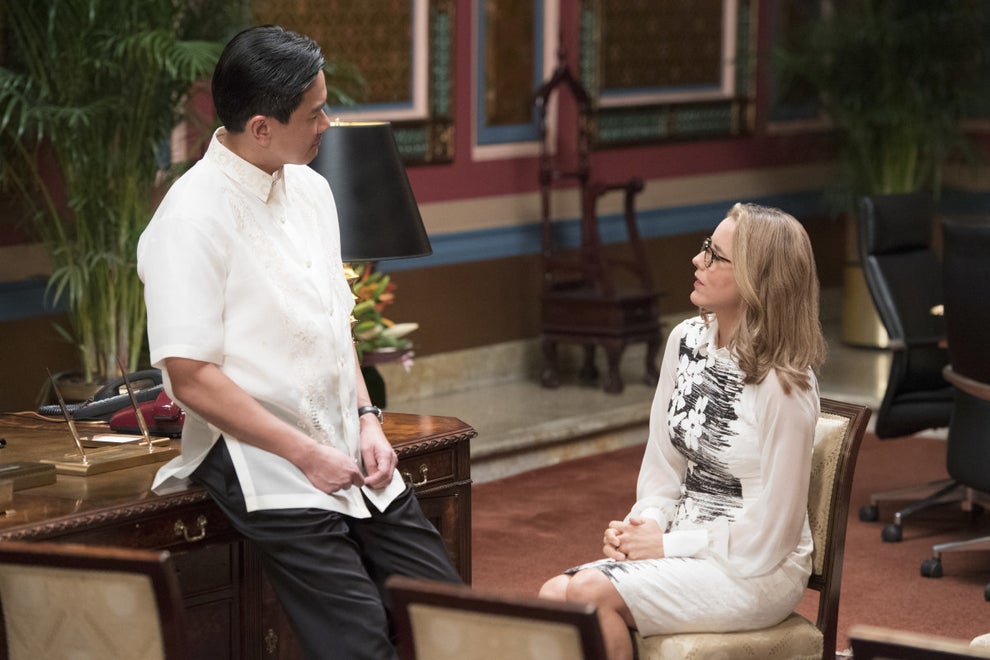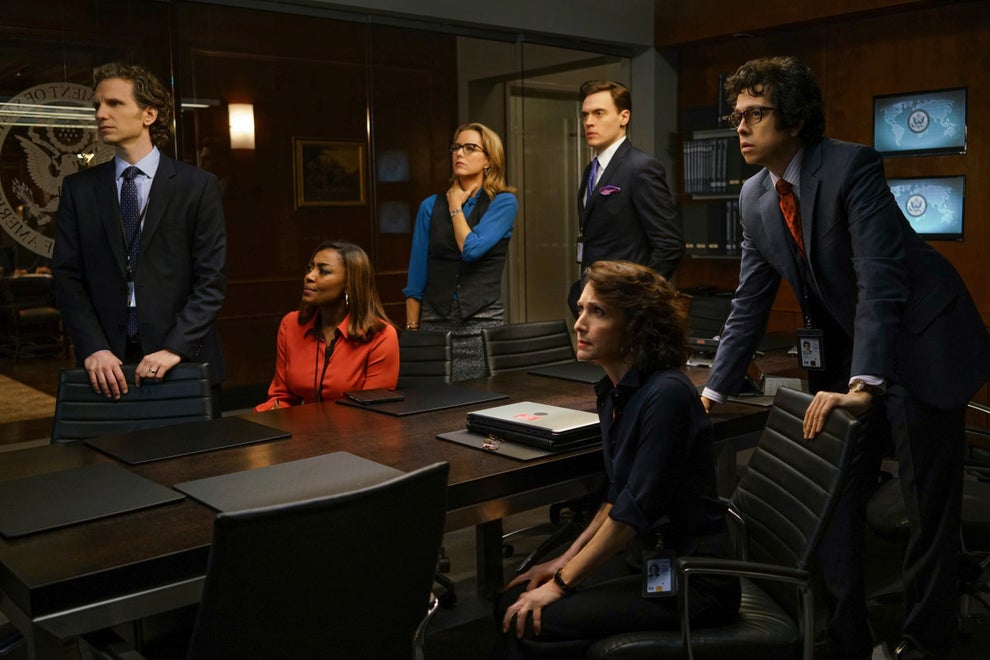
On Dec. 1, 2016, Madam Secretary showrunner Barbara Hall found herself in a familiar position: Her political drama had once again predicted real-world events. That was the day Gambian President Yahya Jammeh shut down the country’s internet during a major election, mirroring a November 2016 episode where the president of Angola did the same in an attempt to dissuade citizens from voicing their dissent, which — he hoped — would ensure his victory.
In a previous example of life imitating art, an episode that aired on Nov. 8, 2015, revolved around an American ISIS leader nicknamed Jihadi Judd, who was killed in a drone strike, and five days later, an actual American ISIS member nicknamed Jihadi John was killed in a drone strike.
Over its three seasons, the CBS drama has routinely borne an eerie similarity to events that grabbed headlines in our real 24-hour news cycle. “I can’t even count in my mind how many things like that have happened,” Hall told BuzzFeed News. Referencing NATO decisions, foreign acts of aggression, and international crimes that have nearly transpired first on her show, Hall said, “It’s a very odd feeling for us.”
While Madam Secretary isn’t intentionally trying to predict current events, it’s not entirely accidental either. “What we would do is take current events and game them out to the extremes,” Hall said, explaining how the show approaches its political storylines. To ground their storylines in truth, the writers work in tandem with a consulting group in Washington, DC, made up of political experts who offer their expertise and help shape elements of every script. “We call them up and sometimes we’ll say, ‘This is the kind of conflict we want to have. Could you give us the countries and the issues?’” Hall said. “Other times we know the situation. Like in the Season 2 premiere, Air Force One went missing and secretary of state became president for a day. With that call they’re like, ‘Well, that wouldn’t happen. It’s, like, a 2% chance.’ So it’s like, ‘Okay, what’s the 2%, because we’ll [write] straight to that.’”
That sliver of possibility could be even further diminished in Season 4 given how unprecedented — and unpredictable — President Trump’s first four months in office have been. Scenarios once deemed too unrealistic for the show’s fastidious authenticators could now play out in real life before the writers even dream them up.
Appropriately, the show itself also has some origins in the real world: When Hall was approached to create the series, executive producers Lori McCreary and Tracy Mercer had been inspired by watching Hillary Clinton (then secretary of state) during the 2014 Benghazi hearings and thinking about what it was like for her to go home at night. Hall quickly cottoned to the idea but had one condition: “It can’t be Hillary. That was my first thing,” she recalled with a laugh. So Hall set out to create an original character with that same capable DNA, and Elizabeth McCord (Téa Leoni) was born. McCord is a former CIA operative who is chosen to become secretary of state by her old friend, President Conrad Dalton (Keith Carradine), when the current secretary dies under suspect circumstances — a mystery that drives much of the first season’s plot.
Hall also made a second, equally crucial decision when crafting the pilot. “You have to ask yourself what the rules are: Are we a parallel universe or are we an alternate universe?” she said. Hall opted for a similar but alternate universe set a few years in the future. So, as in the real world, Barack Obama served two terms as president before Dalton was elected; and the show begins halfway through his first term.
This not only gave Hall the freedom to distance herself from future events — such as the 2016 election — but also allowed her to realistically recast the political landscape with fictional foreign leaders. For example, when there was a problem with Russia in Season 2, Elizabeth didn’t correspond with Vladimir Putin, but instead with Madam Secretary’s devious Maria Ostrov. While these international inventions allows the show to tell stories about foreign countries that are detached from the current state of global affairs, they also open the door for viewers to invent correlations between the characters and the real-world figures who may or may not have inspired them.
Leoni with Joel de la Fuente, who plays Philippine President Datu Andrada. CBS
Like some of its pop culture brethren, Madam Secretary seems to have attracted the attention and ire of our new president. According to the New York Daily News, Donald Trump feels the show is, along with ABC’s Designated Survivor, intentionally crafting storylines designed to malign him and his administration. Trump’s deputy press secretary did not immediately respond to BuzzFeed News’ request for a comment.
One storyline that reportedly upset Trump involved Elizabeth being sexually harassed by the president of the Philippines, a bombastic egotist on the show. But Hall asserts that character wasn’t meant to represent any man in particular; instead, he was a cipher for the misogynistic energy often displayed by male politicians. “First of all, the issue of sexual harassment and sexual assault for any woman, particularly a woman working in a man’s world, that’s just a prevalent discussion,” she said. “I would like for one day it not to be as relevant, but right now it’s extremely relevant. We just took that issue and set it in the world of politics and international relations.”
If people on either side of the political aisle (or in the White House) see intentional similarities between a character on the show and a real-world figure, Hall posits that’s because Madam Secretary is being viewed through a different lens in 2017. “That’s just going to happen anyway when you do extreme characters or colorful characters,” she said. “But we still have been able to maintain a world that’s just about our government inside the show.”
Leoni with Zeljko Ivanek, who plays the president’s chief of staff, Russell Jackson. CBS
Hall did acknowledge one way President Trump has changed her day-to-day on Madam Secretary. “One of the challenges is just trying to stay ahead of the news now,” she offered. “We’re trying to be in the future, but everything is moving so fast. It’s become quite challenging. Sometimes we end up doing stories that are too close to what’s happening through no fault of our own. We were trying to get ahead!”
Even though it opens the show up to speculation, Hall said that setting Madam Secretary in an alternate reality was “absolutely the best decision. It’s always freeing to be a little bit in the future because you can say something has happened that hasn’t; in our world a lot of things have been resolved that haven’t been in reality. Because if you’re doing a parallel universe — which is a government that kind of reflects the government we’re living through right now — it’s so hard to avoid comparisons. It’s so hard to be nonpartisan.”
And maintaining that equality has, more than anything else, been Hall’s goal since day one. “Even back then, the discussion of politics had become so polarized and polarizing that I wanted to create this show where everyone could come to it and talk about politics again,” said Hall, who previously created Judging Amy and Joan of Arcadia. “Almost everyone is interested in politics, but it became so painful to discuss that I wanted to create, if you will, a nonpartisan world to discuss politics.”
Leoni with Sebastian Arcelus, Patina Miller, Erich Bergen, Bebe Neuwirth, and Geoffrey Arend, who play McCord’s staff. CBS
To that end, setting Madam Secretary inside the foreign policy-focused State Department proved invaluable because it meant the show would rarely have to deal with more incendiary domestic issues. “Foreign policy, with some exceptions, tends to be something that becomes partisan after the fact,” she said. “When there’s a big catastrophe or problem or something needs addressing in a foreign country, the first move is problem solving. Later it becomes partisan, that it wasn’t handled correctly.” In fact, Madam Secretary was so successful in maintaining its nonpartisan plan that it wasn’t until the third season that the president’s political party was revealed. And even that was measured: Dalton ran as an independent.
By pushing political parties to the side, Madam Secretary has been able to tell deeply affecting stories that emphasize the needs of the many over the needs of the few. “It’s a humanitarian show because it’s a show about diplomacy,” Hall said. “If you think about war as being a failure of diplomacy, then the State Department is what stops war from happening. It really is a show about people who are committed to creating diplomacy and better relationships between governments.” In her research, Hall encountered an endless stream of “true believers,” people “who really and truly are in government service for all the right reasons and are committed to the job.”
Now, three seasons in, Hall is still driven to give a voice to the people who may not speak or tweet the loudest, but who embarked on their careers in Washington, DC, with the purest of intentions. “I hope [the show] makes people more understanding and less impatient with the government. The State Department is something everybody knows is there but not necessarily knows the inner workings of. But it’s so important! So many things could be issues but don’t become issues because of diplomacy.”
Hall knows she can’t control how people interpret the issues, actions, and characters on her show, yet she maintains hope that every single viewer, regardless of their political identity, recognizes that, yes, the humanitarian government depicted on Madam Secretary is aspirational, but it is also completely attainable. “I felt that way when we started, and I feel that way even more now,” Hall said. “When you reveal how the government is set up to work, you see how much of it is set up correctly and has longevity for a reason. I think that is a valuable service right now, and everybody is struggling to understand what we’re living through. Because it’s an aspirational show, we feel like we really have an opportunity to show people how the government could be and how we’d like it to be. It’s a stretch and it’s a reach, but why not reach! Why not?”




